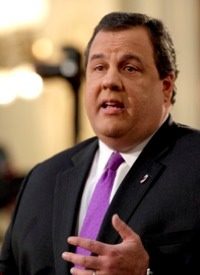
In issuing the conditional veto, Christie asked the state legislature to appoint an overseer to handle complaints from homosexual couples who say the state’s civil unions law, passed in 2006, does not give them the same rights as would the full legalization of same-sex marriage.
“I have been just as adamant that same-sex couples in a civil union deserve the very same rights and benefits enjoyed by married couples — as well as the strict enforcement of those rights and benefits,’’ said Christie in a statement. “Discrimination should not be tolerated and any complaint alleging a violation of a citizen’s right should be investigated and, if appropriate, remedied.”
The Governor also reiterated his call for the legislature to pass a referendum so that voters could have the final say as to how marriage should be defined in their state. “I am adhering to what I’ve said since this bill was first introduced — an issue of this magnitude and importance, which requires a constitutional amendment, should be left to the people of New Jersey to decide,” he said. “I continue to encourage the legislature to trust the people of New Jersey and seek their input by allowing our citizens to vote on a question that represents a profoundly significant societal change. This is the only path to amend our State Constitution and the best way to resolve the issue of same-sex marriage in our state.”
As noted by The New American, Republican State Senator Kip Bateman has drafted a resolution for such a referendum, but Democrat Senate President Steve Sweeney has vowed that he will not allow the measure to come before the full Senate for a vote.
Sweeney called Christie’s veto “a shameful act hidden behind the guise of a public referendum,” and said that he would aggressively pursue an override. “Today [Christie] firmly planted his feet on the wrong side of history,” said Sweeney. “He certainly does not deserve whatever credit he will probably receive for maintaining his misguided position. He had a chance to do the right thing, and failed miserably.”
Ken Sherrill, a political science teacher at New York’s Hunter College, suggested that for Christie, the veto was largely a political move. “For someone who has national aspirations in the Republican party right now, I think there’s not much choice but to take this position,” said Sherrill, who is “married” to another man.
Reed Gusciora, one of the openly homosexual lawmakers who introduced the bill this session, said that it was unfortunate that “the governor would let his own personal ideology infringe on the rights of thousands of New Jerseyans. For all those who oppose marriage equality, their lives would have been completely unchanged by this bill, but for same-sex couples, their lives would have been radically transformed. Unfortunately, the governor couldn’t see past his own personal ambitions to honor this truth.”
Steven Goldstein of Garden State Equality, the main homosexual activist group pushing for the marriage bill, called Christie’s idea of a civil unions overseer “nothing more than the shameless dressing up of a veto of people’s dignity and equality — the equivalent of gold-plating a separate water fountain for a specific class of people.”
Goldstein said that while the veto was personally painful for him and others lobbying for the full legalization of homosexual partnerships, the “great news is we have until the end of the legislative session, in January 2014,” to overturn it. He vowed that homosexuals throughout the state would “continue to fight [for] marriage equality with every bone in our bodies…. For us, this is not about politics. This is about our fundamental American right to conduct our lives with a full life, liberty and the pursuit of happiness…. And until we achieve it, we will fight with our every last breath. And we will win, so help me God.”
Pro-family forces in New Jersey applauded the Governor’s veto, and vowed to continue their efforts to defend traditional marriage. Gregory Quinlan of the New Jersey Family Policy Council said he was grateful to the Governor for keeping his promise to veto the bill. The group’s founder and president, Len Deo, said that pro-family activists would work with Gov. Christie and conservative legislators to block a veto override and to push for a state-wide referendum.
“Those in favor of this bill have long argued that the people shouldn’t be allowed to vote on retaining marriage as the union of one man and one woman, but rather that the legislature should decide for them,” said Deo. “They have tried the courts and now the legislature; however, we believe this is such a huge public policy shift that the people should weigh in. This is a cultural issue; the legislature has no right to redefine marriage for the whole of New Jersey. You cannot redefine that which you did not create. Let the people have a say in this all-important question.”
In related news, shortly after Christie vetoed New Jersey’s same-sex marriage bill, Maryland’s House of Delegates passed a bill, sponsored by Governor Martin O’Malley, to legalize homosexual marriage in that state. While the bill passed by a razor-thin 72-67 vote, it is expected to pass easily in the state’s Senate. If it does and the Governor signs the bill, Maryland would become the eighth state to legalize same-sex marriage, following Washington, where Governor Chris Gregoire signed a similar law on February 13 for which she had aggressively lobbied. As in both Washington and New Jersey, pro-family leaders in Maryland have said they will work to get a referendum on the state ballot to allow voters to have the final say on how marriage is defined in that state.
Photo of Gov. Chris Christie: AP Images



